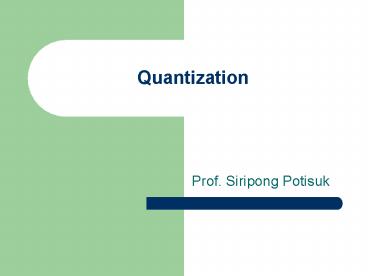Quantization PowerPoint PPT Presentation
1 / 24
Title: Quantization
1
Quantization
- Prof. Siripong Potisuk
2
A Block Diagram of a DSP System
3
Analog-to-Digital Conversion (ADC)
- Discretize the independent variable or time of an
analog signal (Sampling) - Discretize the dependent variable or amplitude of
an analog signal by rounding off to the nearest
integer (Quantization) - Each quantization level represented using binary
encoding scheme (Encoding) - Flash, Successive approximation, Sigma-delta
4
A Typical ADC Process
The process of converting analog voltage with
infinite precision to finite precision is called
the quantization process.
5
Analog-to-Digital Conversion (ADC)
6
Quantizer Input-output Characteristics
- Similar to passing a discrete-time signal through
a piecewise constant staircase type function - 2 types mid-tread and mid-rise
7
(No Transcript)
8
(No Transcript)
9
Quantization Level
- Suppose the value of xn ranges over the
interval xmin, xmax. The spacing between
adjacent quantization level or step size (ADC
resolution) is - L of quantization levels
- N of binary bits used to represent the value
of xn - The resulting quantization level, xq , is
- i is an index corresponding to the binary code
10
Example
- A speech signal has a maximum frequency of 4
kHz. We want to digitize it and send it in a file
using 2 bytes (i.e., 16 bits) per sample. What
would be the minimum length of the file occupied
by the signal for each minute of recording?
Assume the signal is not compressed.
11
Quantization Error
- Also known as quantization noise
- Modeled as a random variable uniformly
distributed over the interval -D/2, D/2 with
probability density p(eq) 1/D. - The average power of the quantization noise is
12
(No Transcript)
13
Example 2.9 2.10 (text)
Assuming that a 3-bit ADC accepts an analog input
ranging from 0 to 5 volts, determine (a) the
number of quantization levels (b) the step size
or resolution of the quantizer (c) the
quantization level corresponding to the
analog value of 3.2 volts (d) the binary code
produced by the encoder. (e) the quantization
error corresponding to the 3.2-V analog
input.
14
Problem 2.27 (text)
Assuming that a 3-bit ADC accepts an analog input
ranging from -2.5 to 2.5 volts, determine (a)
the number of quantization levels (b) the step
size or resolution of the quantizer (c) the
quantization level corresponding to the
analog value of -1.2 volts (d) the binary code
produced by the encoder. (e) the quantization
error corresponding to the analog input.
15
Example
- Suppose the amplitude of a discrete-time
signal xn is constrained to lie in the interval
-10, 10. If the average power of the
quantization noise is to be less than 0.001, what
is the minimum number of bits that are needed to
represent the value of xn?
16
Signal-to-quantization Noise Ratio (SNRq)
- A figure of merit expressed in terms of the ratio
between signal power and the quantization noise
power - Usually expressed in decibels (dB)
17
Special Case The signal has a full-scale dynamic
range
Thus,
For a full-scale sinusoidal signal with amplitude
A,
Increasing 1 bit of the ADC quantizer can improve
SNRq by 6 dB ? The 6-dB rule
18
Example
- In a DSP system, the output SNRq is to be
held to a - minimum of 40 dB. Determine the number of
required quantization levels, and the
corresponding - SNRq assuming a full-scale sinusoidal input.
19
Flash ADC Unit
- One of several ways to implement ADC
- Consists of a series of reference voltages
created by equal resistors - A set of comparators is used to compare the input
voltage with the reference voltages - An encoding logic unit outputs the binary
sequence - Offers high conversion speed
- Impractical for high-resolution applications
20
An Example of a Simple 2-bit Flash ADC
21
Non-uniform Quantization
- Needed for signals whose smaller amplitudes
predominate and larger ones are rare (i.e., - speech)
- Difficult to design
22
Companding
- Pre- and post-processing applied to a uniform
quantizer to achieve non-uniform quantization - The combination of compression and expansion
- The signal samples first compressed before
passing through a uniform quantizer - To restore the signal samples to their correct
relative level, an expander with a characteristic
complementary to that of the compressor is used
in the receiver
23
Characteristics of a compressor
24
Compression Law
- ? -law (used in digital telephony in North
America Japan with ? 255) - A-law (used in Europe with A 87.6)

